On Capitol Hill yesterday, Sens. Orrin Hatch (R-Utah) and Lamar Alexander (R-Tenn.) spent the day after President Obama's second inaugural pushing a new bill: the two hope to eliminate the individual mandate in the Affordable Care Act. Hatch said the existing policy runs "counter to our constitutional framework," ignoring the Supreme Court ruling to the contrary.
There was a time that a bill like this would cause some consternation, and lead folks like me to write posts explaining how and why the Hatch/Alexander plan would increase health care costs by scrapping a policy that Republicans came up with in the first place.
But those days are gone, and bills like these no longer generate anger. Instead, these efforts now seem more pathetic than infuriating. They pop up, find no co-sponsors, are widely ignored even by the right, and it feels like the Republican proponents are just going through the motions, hoping to maybe get a fundraising letter or a Fox News appearance out of pointless legislation.
While conservatives may be loath to admit it, "Obamacare" is moving forward, and even many Republican policymakers are grudgingly hopping on the advancing train. USA Today noted developments at the state level.
Two months ago, Republican opposition was virtually uniform across the country. But cracks are appearing and they will widen, predicts Larry Jacobs, director of the Center for the Study of Politics and Governance at the University of Minnesota. "The arc of partisan fever is beginning to recede, and pragmatism is beginning to come to the fore," he says.
Mississippi's Republican Insurance Commissioner sees the Affordable Care Act as a good deal for his state's residents. Arizona Gov. Jan Brewer (R) didn't want to accept Medicaid expansion in her state, but she did it anyway -- it was apparently a case of "math trumping ideology." The Republican governors in New Mexico, North Dakota, and Nevada recently reached the same conclusion on Medicaid, while the Republican governor of Idaho recently endorsed the creation of an Obamacare "exchange."
This is the exact opposite of what the right had hoped for.
For many conservatives, state implementation -- or in this case, the lack thereof -- was the next key step in fighting the Affordable Care Act. It didn't matter how many families the law would help; what mattered was trying to kill Obamacare as part of a larger partisan/ideological battle.
And to be sure, the right's lobbying has had some effect. Many "red" state officials, especially Republican governors who harbor national ambitions, are doing as they're told -- rejecting Medicaid expansion and the creation of exchange marketplaces simply so they can say they're doing their part to block implementation of the law.
But given Republican apoplexy over health care policy, I think the more important breakthrough is just how many Republicans are doing the opposite -- taking a good look at the Affordable Care Act, recognizing its benefits, and being pragmatic about providing affordable care for their constituents.
Indeed, the broader landscape suggests the Republican diehards, who'll keep hating Obamacare just for the sake of hating Obamacare, are spinning their wheels. House Speaker John Boehner (R-Ohio) called the Affordable Care Act "the law of the land"; public support for repeal is evaporating; and when folks like Hatch and Michele Bachmann unveil repeal bills, few even bat an eyelash.
The Affordable Care Act isn't going anywhere.
